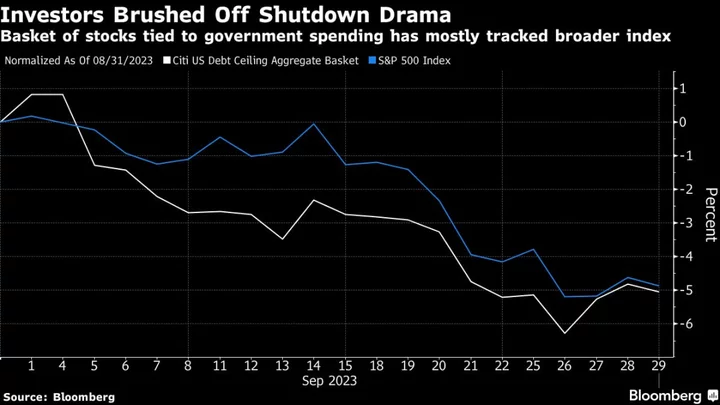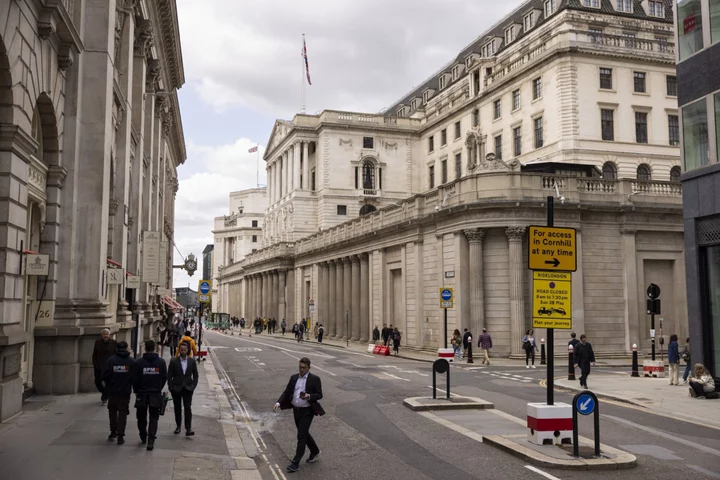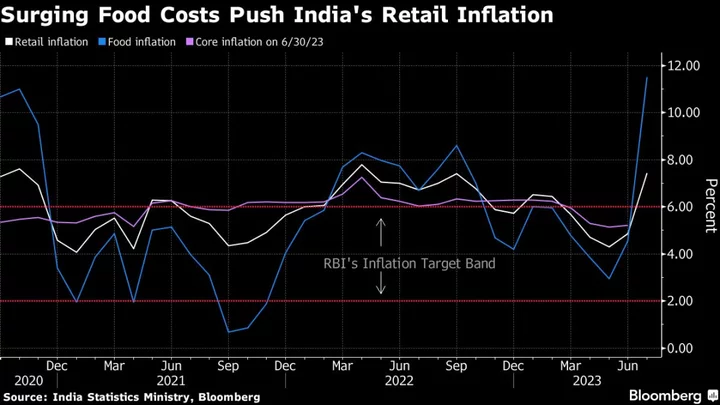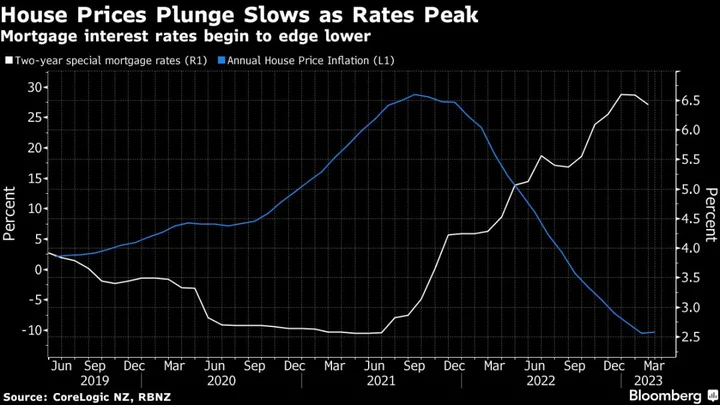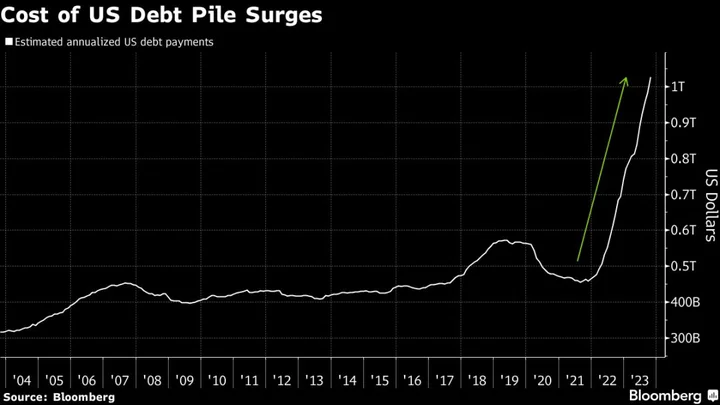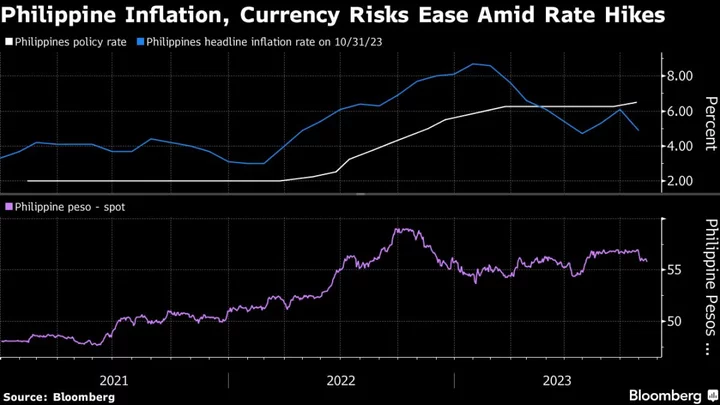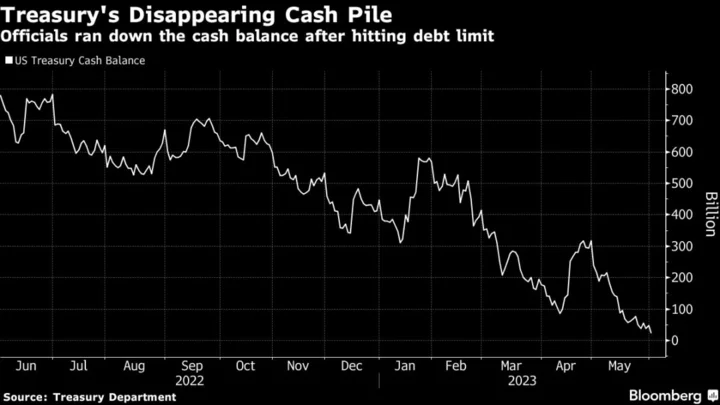An against-the-odds deal to avert a US shutdown is soothing nerves across Wall Street after a week of interest rate-spurred market disruptions.
While money managers largely shrugged off the political circus in Washington, the passage of compromise legislation to keep the government running until Nov. 17 gives financial markets some breathing room after the recent plunge in stocks and bonds.
A handful of analysts had warned that an extended closure of federal agencies would spur fresh gyrations in the Treasury curve — fueling cross-asset volatility — and hit stocks that rely on government spending, like defense contractors and pharmaceutical companies.
For now though, Democrats and Republicans have bought some time to negotiate longer-term funding.
Read more: Market Stress Rises Over Wild Week Ahead Even Without a Shutdown
Here’s how market players reacted to the fiscal machinations this weekend.
Yung-Yu Ma, chief investment officer at BMO Wealth Management:
“Financial markets were bracing for a shutdown, so there’s an element of relief, but it’s only a temporary lifting of one of the clouds hanging over the markets now. Interest rates and Fed hawkishness remain the name of the game and the main driver of the markets over the next few weeks.”
Dan Suzuki, deputy chief investment officer at Richard Bernstein Advisors:
“The potential for a lasting impact on the economy from a shutdown was quite low, particularly relative to the other swing factors out there, such as inflation, the Fed and overall growth. And while investors can take some solace in the removal of an overhang, if markets weren’t pricing in significant downside risk from a shutdown, then the avoidance shouldn’t be a big source of upside either. One issue is that this just delays the pain until November, and in the meantime, the political circus will probably ramp up and further corrode people’s confidence in the government.”
Adam Crisafulli, founder at Vital Knowledge:
“There wasn’t that much anxiety over a shutdown, so there shouldn’t be a huge, sustained rally simply because one has been avoided.
In addition, the matter hasn’t been fully resolved — it just moves the expiration date from 9/30 to 11/17 — and with bond vigilantes roaming the financial plains once again, addressing the country’s enormous deficits is something bonds (and thus stocks) would welcome.
That said, investors will be happy that the Sept economic numbers (including jobs on 10/6 and the CPI on 10/12) won’t be delayed and if those figures comport with the recent cooling trend, which is expected, it will help propel equities higher. We think the recent rally, which started on Wed, will extent further, but investors should look to take profits at the 4500-4550 level.”
Steve Sosnick, chief strategist at Interactive Brokers:
“It should be a modest positive. It’s not as though markets seemed overly concerned about the prospect of a shutdown, so they won’t be euphoric about kicking the can down the road for 45 days. But it’s better than the alternative. It doesn’t really affect most stocks and bonds except psychologically.”
Sonia Meskin, head of US macro at BNY Mellon Investment Management:
“..factors driving rates and rate term premium higher may be more long-lasting in nature than shutdown developments alone. The US Treasury term premium turned positive last week, which means investors are asking for higher compensation to hold longer-dated securities.
While the term premium is not directly observable, we know it is driven by several factors, including: expectations for higher level of rates and rate volatility; concerns around US fiscal trajectory; and slower foreign investor demand precisely at the time when the US Treasury funding needs rise.”
Matt Maley, chief market strategist at Miller Tabak & Co LLC:
“I worry that any positive response to the deal will be relatively short-lived. Most of the recent weakness — rise in interest rates and the decline in the stock market — has had little to do with the potential shutdown of the government. The bond market has been pricing in ‘higher for longer’ for five to six months, while the stock market has just begun to start pricing in this idea.”
--With assistance from Vildana Hajric and Boris Korby.
Author: Isabelle Lee, Emily Graffeo and Denitsa Tsekova

